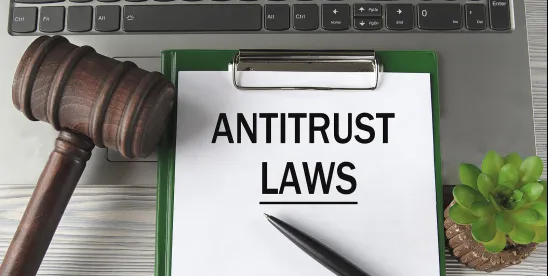On January 16, 2025, three days before President Trump’s inauguration, the Federal Trade Commission (FTC) and the Department of Justice Antitrust Division (DOJ) jointly issued the Antitrust Guidelines for Business Activities Affecting Workers (the “2025 Guidelines”). The 2025 Guidelines, which do not have the force of law, explain how the agencies assess business practices affecting workers that may violate antitrust laws.
The 2025 Guidelines replace the 2016 Antitrust Guidance for Human Resources Professionals (the “2016 Guidance”). The 2016 Guidance provided principles and specific real-world examples to help HR professionals avoid running afoul of antitrust laws. The new guidelines address a wider range of business practices, including non-compete agreements and restrictions in the independent contractor and franchise settings, providing a non-exhaustive list of practices that may be unlawful:
- Wage-fixing and no-poach agreements. Like the 2016 Guidance, the 2025 Guidelines state that agreements between businesses not to recruit, solicit, or hire workers (known as “no-poach” agreements) or to fix wages or terms of employment, may violate antitrust laws and lead to criminal prosecution.
- Franchise no-poach agreements. The 2025 Guidelines extend the no-poach prohibition to the franchise context, explaining that agreements in which a franchisor and franchisee agree not to compete for workers may be subject to antitrust scrutiny.
- Sharing sensitive information with competitors. The 2025 Guidelines reiterate that sharing information with competitors about terms and conditions of employment may be unlawful if the information exchange has, or is likely to have, an anticompetitive effect. Providing such confidential information through an algorithm or a third party’s tool or product may also be unlawful.
- Non-compete agreements. Echoing the Biden-era FTC’s focus on non-compete agreements, the 2025 Guidelines state that non-compete clauses that restrict workers from switching jobs or starting a competing business can violate antitrust laws. The 2016 Guidance specifically declined to take a position on the validity of non-competes. Acknowledging the August 2024 court order setting aside the FTC rule banning most non-compete agreements, the new guidance stresses that the FTC retains the legal authority to address non-competes through case-by-case enforcement actions.
- Other restrictive, exclusionary, or predatory employment conditions. In a catch-all category, the 2025 Guidelines provide that other restrictive, exclusionary, or predatory employment conditions, including certain non-disclosure agreements, training repayment obligations, non-solicitation agreements, and exit fee and liquidated damages provisions may violate antitrust laws.
- Agreements with independent contractors. Another new principle in the 2025 Guidelines is that antitrust laws apply to agreements that businesses reach with independent contractors. The guidelines specifically cite the growth of app-based businesses that use independent contractors rather than employees to match workers with consumers seeking their services (i.e., gig economy relationships). An agreement between two or more competing platforms to fix the compensation of independent contractors offering their services via the platforms may constitute a per se violation of antitrust laws.
- False earnings claims. Finally, the 2025 Guidelines state that the FTC and DOJ may investigate and take action against businesses that make false or misleading claims about potential earnings that workers may realize.
The future of the 2025 Guidelines is uncertain under the new administration. The FTC approved the guidelines by a 3-2 vote, with incoming FTC Commissioner Andrew Ferguson dissenting. In his dissenting statement, Ferguson called the FTC’s replacement of the 2016 Guidance “mere days before they hand over the baton … a senseless waste of Commission resources.” After the Senate confirms the third Republican Commissioner, the FTC may vote to rescind the 2025 Guidelines and either issue new guidance or revert to the 2016 Guidance, which was issued at the end of the Obama administration and remained in place during the first Trump administration.
While the specifics of the new administration’s antitrust policy remain to be seen, employers should review the business practices discussed in the 2025 Guidelines with employment and antitrust counsel to ensure they are appropriately tailored to achieve their purpose while minimizing harm to competition.







 />i
/>i

